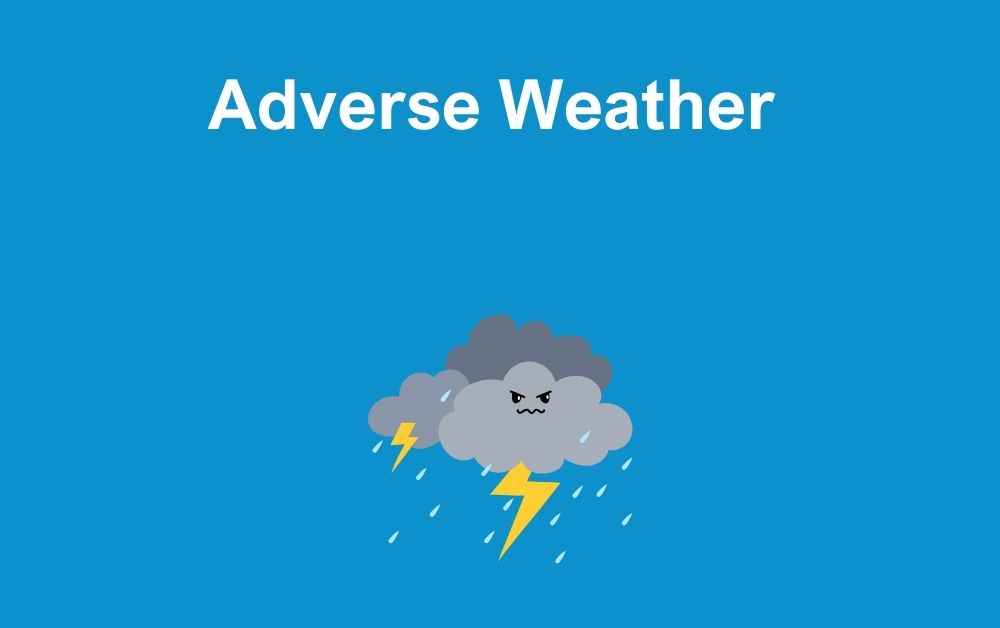The Met Office warned yesterday that adverse weather, Storm Eowyn is on its way and will be bringing hurricane force winds of up to 100mph along with it. Red and Amber warnings have been issued and the public have been advised to stay indoors. They have also been encouraged to avoid travel. This has led to school closures, public transport cancelled, and an overall disruption to public services.
Parts of Scotland and the whole of Northern Ireland have been given a Red weather warning. This is the most serious warning the Met Office can give. This has led to businesses having to make quick decisions to protect their staff and business.
In this blog post, we aim to answer all your questions about managing adverse weather in the workplace. We have also answered whether employees should be paid if they are unable to attend work.
I have had an employee unable to attend work due to adverse weather conditions, do I still need to pay them?
No, you are not legally required to pay employees if they are unable to make it to work due to adverse weather conditions. This is because you are not technically responsible for how your employee gets to work. It can also be considered not fulfilling their employment contract. Therefore, you are not legally expected to pay them.
However, under these circumstances, we encourage you to support your employees while maintaining fairness and consistency. This means looking at suitable alternatives.
If you can pay your staff, it can be a good idea to do so. This will strengthen your reputation as an employer and boost trust and morale in the workplace.
Do I have to Pay Employees If I’ve Closed the workplace during adverse weather events?
If the business is unable to open or you have taken the decision to close due to the adverse weather, the employees are entitled to their normal rate of pay. Communicating this clearly to your team and ensuring they understand their entitlements is essential. This will help you maintain trust and morale during disruptions.
What Alternatives can I offer staff if they’re unable to come in to the office?
If you need employees to work despite severe weather conditions, there are several options you can consider to balance business needs with employee safety and wellbeing:
- Remote Working: If the nature of the work allows it, encourage employees to work from home. Providing the necessary tools. This includes access to laptops, communication software, or cloud-based platforms. Having these tools help maintain productivity during adverse weather.
- Flexible Working Hours: Adjust work schedules to allow employees to travel during safer conditions. Examples of this includes starting later in the day or leaving earlier. This demonstrates flexibility and prioritises safety.
- Annual Leave: You can allow employees to take a day of paid annual leave. Most employees will prefer to use holiday entitlement instead of losing a day’s pay.
Do I have to allow employees to take time off if their children’s school or childcare provider is closed due to adverse weather?
Employees have a statutory right to take a reasonable amount of unpaid time off to deal with emergencies involving their dependants. This right ensures that employees can respond to unexpected situations without fear of losing their job.
This right applies specifically when an employee needs to take time off work due to an unforeseen disruption in the care arrangements for a dependant.
Employers should handle such situations with understanding and flexibility. This is important to allow employees to focus on resolving their emergency without additional stress. Clear policies and open communication are essential for ensuring both parties understand their rights and responsibilities in these situations.
Adverse Weather Policies: What to Include and Why They Matter
An adverse weather policy is an essential tool for employers to manage disruptions caused by extreme weather. This clarity and consistency in how such situations are handled. Having a clear policy in place helps protect both the business and employees while minimising confusion during unpredictable events.
What to Include in an Adverse Weather Policy:
- Attendance Expectations: Outline whether employees are expected to make efforts to attend work. Also include what conditions they may be excused.
- Pay Guidelines: Specify whether employees will be paid if they are unable to attend work due to weather-related issues or if the business is forced to close.
- Remote Working Options: Include guidance on when employees may work from home and the arrangements required to facilitate this.
- Use of Leave: Clarify whether employees can use annual leave, unpaid leave, or make up lost hours in cases of absence due to adverse weather.
- Company Vehicles: Ensure employees driving company vehicles understand their responsibilities, prioritise regular maintenance checks, and are prepared for winter weather conditions with safety essentials.
- Workplace premises: Managers should ensure car parks and pavements are gritted to prevent accidents and encourage employees to explore safe alternative transport during severe weather.
- Notification Procedures: Define how employees should inform the business if they are unable to attend work and how the business will communicate closures or operational changes.
Why It’s Important to Have an Adverse Weather Policy:
- Clarity and Consistency: A policy ensures all employees are treated fairly and consistently, reducing the risk of disputes or misunderstandings.
- Business Continuity: Clear guidelines allow for better planning, enabling the business to maintain operations wherever possible during poor weather.
- Employee Wellbeing: By addressing safety concerns and providing flexible options, the policy demonstrates a commitment to employee welfare, boosting morale and trust.
- Legal Compliance: A written policy helps ensure compliance with employment laws and provides a reference point for handling disputes or grievances.
An adverse weather policy is a proactive measure that benefits both employers and employees, ensuring smooth operations and mutual understanding in challenging circumstances.
How The HR Booth Can Help
At The HR Booth, we understand the challenges adverse weather can bring to your business and workforce. Our team is here to provide expert advice and practical solutions, from creating robust policies to addressing employee concerns. If you need guidance or support, don’t hesitate to reach out.
You can contact us directly on 01383 668 178, or visit our website for more information. Let us help you navigate these situations with confidence and ensure your business is prepared for anything.







